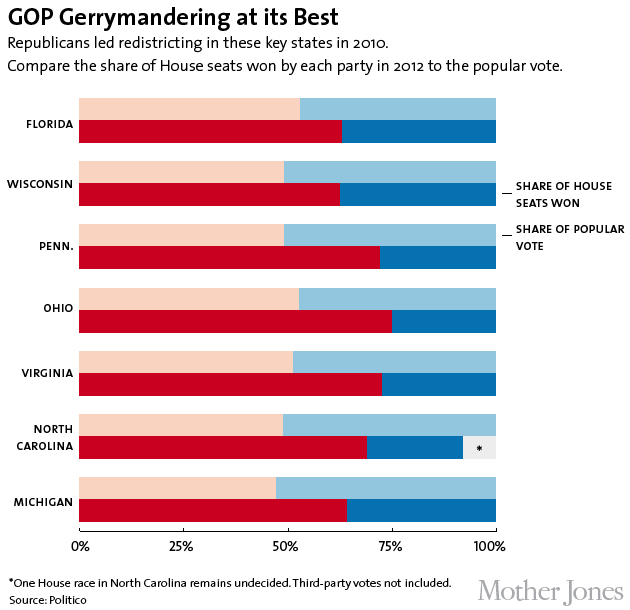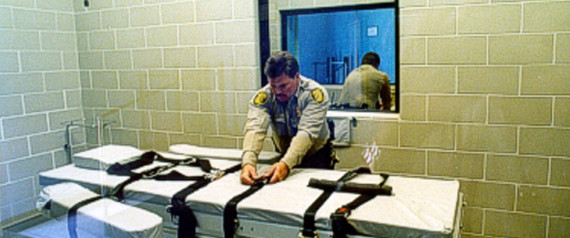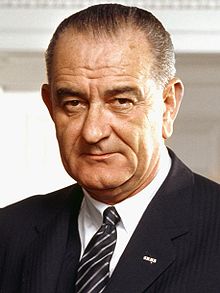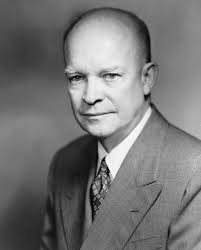Until recently, the state of North Carolina, where I live, was a bastion of political moderation, especially compared to our neighbors in the southeast. Our politics were moderate in part because the Democratic Party remained relatively strong in the state, and to survive in this region of the country had embraced center left, rather than the far left. Our politics were also moderate because of the influx of Northerners, arriving to places like the Raleigh Durham area where I live. As a result of this moderation, we developed high-tech industry corridors, provided excellent funding to our educational system, and became a pretty darn nice place to live.
This past year, Republicans took control of state government, and did not exactly pursue an agenda of political moderation. Moreover, this swing to the right was not justified by the political beliefs of the North Carolina population. Instead, a decent amount of the Republican’s political power resulted from gerrymandering, after the 2010 census. To get a sense of that, take a look at this figure from Mother Jones.

We really ought to give the job of political redistricting to nonpartisan commissions. Our democracy deserves better than this!
(Click here to view comments)

 As anyone who has followed the Obamacare roller coaster over the past 4 years knows, passing legislation is only the first step in reforming a healthcare system. Since Obamacare came into law, we have been consumed by battles over how to implement it, and by struggles over how to make it work effectively. But such implementation struggles are not new to Obamacare. We sometimes fail to remember that previous healthcare laws rolled out with a fair amount of controversy of their own.
As anyone who has followed the Obamacare roller coaster over the past 4 years knows, passing legislation is only the first step in reforming a healthcare system. Since Obamacare came into law, we have been consumed by battles over how to implement it, and by struggles over how to make it work effectively. But such implementation struggles are not new to Obamacare. We sometimes fail to remember that previous healthcare laws rolled out with a fair amount of controversy of their own. The American Society of Clinical Oncology is one of the leading specialty organizations for physicians who take care of patients with cancer. A reporter from ASCO just wrote a nice piece, in which she questioned me to go into more detail about the challenge of discussing cost of care with oncology patients. I thought I would share that with you:
The American Society of Clinical Oncology is one of the leading specialty organizations for physicians who take care of patients with cancer. A reporter from ASCO just wrote a nice piece, in which she questioned me to go into more detail about the challenge of discussing cost of care with oncology patients. I thought I would share that with you: Several people have asked me lately whether I think that death row inmates should be able to
Several people have asked me lately whether I think that death row inmates should be able to  Lyndon Johnson’s advisers were worried. They were drafting a Medicare proposal, a major component of Johnson’s war on poverty. But the cost of this program was turning out to be much larger than expected. By their estimates, in the first year alone, they would face $400 million more in expenditures than they had budgeted for. The advisers asked Johnson what the administration should do, and Johnson replied: “Well, I guess I’ll run and get my brother.” That answer didn’t make sense to his aides, of course. So he continued:
Lyndon Johnson’s advisers were worried. They were drafting a Medicare proposal, a major component of Johnson’s war on poverty. But the cost of this program was turning out to be much larger than expected. By their estimates, in the first year alone, they would face $400 million more in expenditures than they had budgeted for. The advisers asked Johnson what the administration should do, and Johnson replied: “Well, I guess I’ll run and get my brother.” That answer didn’t make sense to his aides, of course. So he continued: The Obamacare health insurance exchanges have been up and running for only a few months now, with a semi-functioning website active for even less time than that. So it is far too early to tell who will benefit and who will be harmed as the law continues to unfold. In the absence of solid data, that leaves us with stories. And here are a few stories, reported on in the Fayetteville Observer, to give you feel for the range of experiences people are having lately.
The Obamacare health insurance exchanges have been up and running for only a few months now, with a semi-functioning website active for even less time than that. So it is far too early to tell who will benefit and who will be harmed as the law continues to unfold. In the absence of solid data, that leaves us with stories. And here are a few stories, reported on in the Fayetteville Observer, to give you feel for the range of experiences people are having lately. Tired of all those family newsletters that inundate you with overwhelming detail on all the amazing accomplishments of your friends’ children? I thought I would address that issue, in my latest edition of my own family newsletter. Hope you enjoy:
Tired of all those family newsletters that inundate you with overwhelming detail on all the amazing accomplishments of your friends’ children? I thought I would address that issue, in my latest edition of my own family newsletter. Hope you enjoy:  On October 10, 1952, President Dwight Eisenhower gave a speech in Salt Lake City in which he reiterated his opposition to socialized medicine. In fact, he had long asserted that he would “use every single attribute and influence of the Presidential office to defeat any move toward socialized medicine.” But Ike also recognized that all Americans deserve some kind of basic medical care. Not long before his trip to Salt Lake, he had stated that: “Too many of our people live too far from adequate medical aid; too many of our people find the cost of adequate medical care too heavy.” Eisenhower’s compassion came in part from personal experience. He had seen his wife’s family “virtually wrecked” from having to pay big medical bills.
On October 10, 1952, President Dwight Eisenhower gave a speech in Salt Lake City in which he reiterated his opposition to socialized medicine. In fact, he had long asserted that he would “use every single attribute and influence of the Presidential office to defeat any move toward socialized medicine.” But Ike also recognized that all Americans deserve some kind of basic medical care. Not long before his trip to Salt Lake, he had stated that: “Too many of our people live too far from adequate medical aid; too many of our people find the cost of adequate medical care too heavy.” Eisenhower’s compassion came in part from personal experience. He had seen his wife’s family “virtually wrecked” from having to pay big medical bills. In a
In a